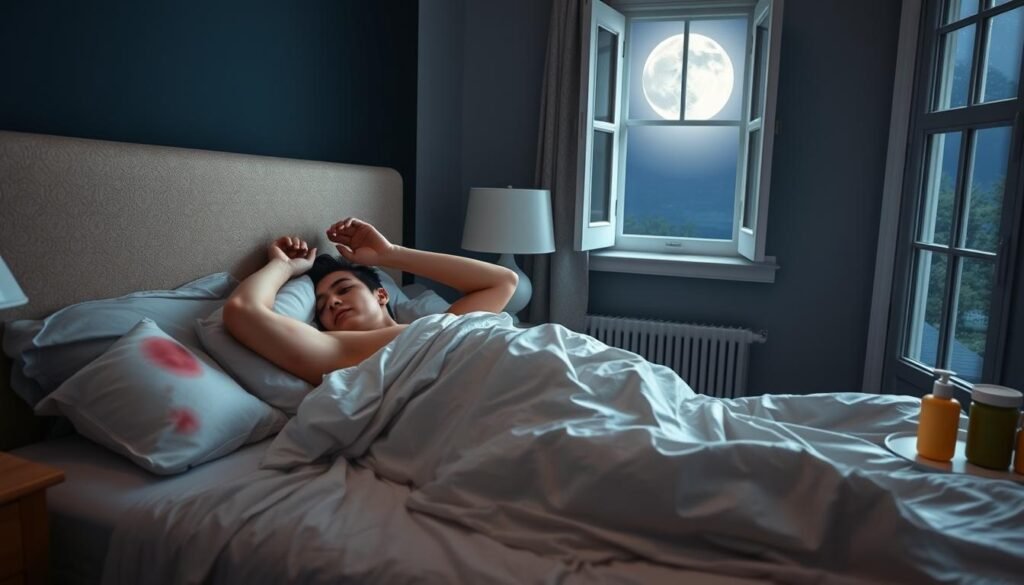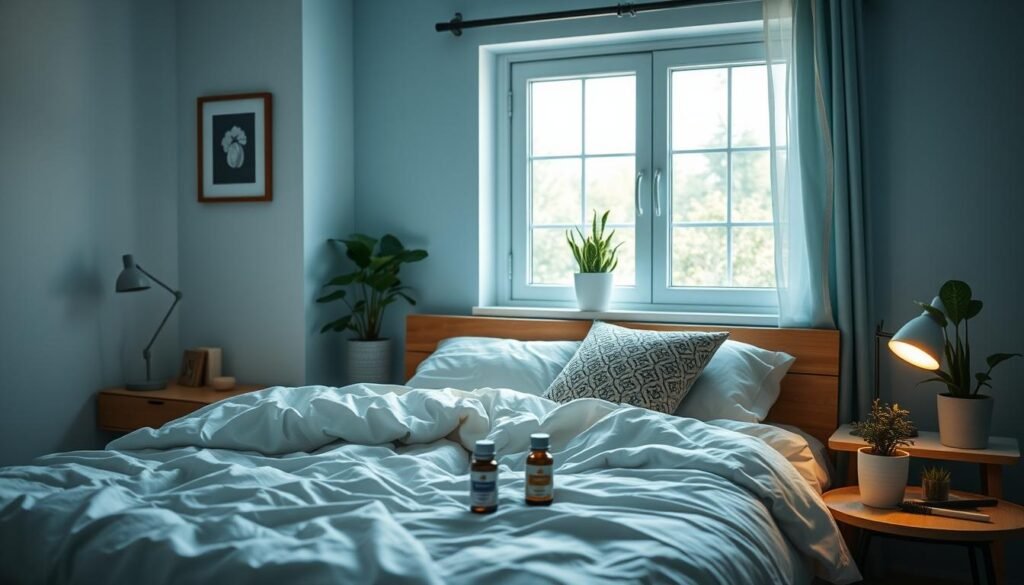Did you know that between 47% and 80% of kids with atopic dermatitis struggle to sleep? And it’s not just kids. Between 33% and 90% of adults face this too. The main reason is the intense itchiness from this skin problem. It stops people from getting the rest they need. When someone with atopic dermatitis tries to sleep, the urge to scratch can be overwhelming. This itching in Atopic Dermatitis leads to restless nights. It can also make people more anxious and lower their quality of life.
Up to 80% of kids with eczema find it hard to sleep when their skin flares up. This can really affect their happiness and how they grow. Parents lose sleep too, showing that it’s not just the person with eczema who suffers. Understanding how skin inflammation from atopic dermatitis affects sleep is key. We need good plans to deal with this. This article looks at how itching impacts sleep for those with AD. It uses important research findings.
Key Takeaways
- Sleep issues are common in many people with atopic dermatitis.
- The itch from eczema can badly impact how well someone sleeps.
- The worse the disease, the bigger the sleep problems.
- Parents and brothers or sisters also feel the effects of a child’s sleep trouble.
- Knowing what triggers bad skin reactions can help control sleep issues.
- Effective management strategies are key to improving life with atopic dermatitis.
Introduction to Atopic Dermatitis and Sleep Disturbances
Atopic dermatitis (AD), a common chronic skin problem, affects millions in the U.S. It comes with intense itching that lowers life quality. The long-term nature of AD often leads to sleep problems, making things worse.
Studies show that kids with AD face more sleep disruptions. They wake up often and stay awake longer before sleeping again. A large number, 47% to 80%, of these kids struggle with sleep, greatly affecting their daily lives. Most of them wake up many times a night. They also spend over an hour trying to sleep again after waking up.
Sleep issues can lead to trouble with thinking, behavior, and feelings like anxiety and depression. Understanding how AD and sleep problems are linked is key. For more on this topic, follow this link: overview of atopic dermatitis.
The Impact of Itching in Atopic Dermatitis on Sleep
Itching and sleep problems are closely linked in people with atopic dermatitis. This skin issue doesn’t just cause itching. It also messes with sleep.
Nearly 80% of kids with this skin condition have trouble sleeping. Among adults, up to 90% face similar sleep problems. They often wake up at night, which breaks their sleep. This can really affect their life.
When itching lasts a long time, sleep quality drops a lot. People with worse atopic dermatitis are more likely to have sleep issues. If they also have asthma or allergies, their sleep gets even worse. The risk of poor sleep jumps to 79% for them.
Loss of sleep can hurt your quality of life. You might feel tired, moody, and weak. How bad the itching is can affect your sleep, mood, and health. It can start a cycle of not sleeping enough. This cycle can harm your body, feelings, and social life.
To learn more about itching and sleep in atopic dermatitis, check the Sleep-Loss Scale. It shows how itching impacts sleep. This tool gives important details on sleep loss in people with this condition.
Understanding the Mechanisms Behind Sleep Disruption
Sleep problems in people with atopic dermatitis are due to many factors. The itch-scratch cycle is key among these. It leads to more skin problems and sleepless nights, hurting one’s health.
A lot of studies show that nearly everyone with atopic dermatitis suffers from itchiness. This affects their sleep and mental well-being. The parts of the brain that handle emotions and pain work more during itchiness. This makes the itch-scratch problem even worse, especially for those with sleep issues from atopic dermatitis.
Certain proteins like interleukin IL-31 are important in causing itchiness. Studies have found that stopping IL-31 can help reduce this itch. Also, people with this skin condition have more immune cells that lead to inflammation and itching. This makes it harder to sleep well.
To manage atopic dermatitis better, we need to understand how it disrupts sleep. It’s crucial to treat both the itchiness and its effects on mental health. This could help improve sleep for those affected.
Common Symptoms of Atopic Dermatitis That Affect Sleep
Atopic dermatitis leads to several symptoms that make sleeping hard. People often feel an intense itch, known as severe pruritus. This itch gets worse at night, messing up sleep patterns. The skin also becomes inflamed and dry, making it tough to sleep well.
The need to scratch can harm the skin and raise the chance of infections. Many do it without realizing while they sleep, making skin problems worse. Things like dust, pet dander, and certain foods can trigger atopic dermatitis. These triggers can cause symptoms to flare up, making a good night’s sleep even harder to achieve.
Knowing these symptoms helps in managing them better. Recognizing what to look out for leads to improved sleep habits and skin care. This can significantly enhance sleep quality for those dealing with atopic dermatitis.

| Symptom | Impact on Sleep |
|---|---|
| Severe Pruritus | Disrupts ability to fall and stay asleep |
| Skin Inflammation | Causes discomfort and worsens itch at night |
| Dry Skin | Increases likelihood of scratching and irritation |
| Scratching | Leads to skin damage, further complicating sleep issues |
| Environmental Triggers | Can provoke flares and disrupt sleep |
Management Strategies for Itching in Atopic Dermatitis
It’s key to manage itching for those with atopic dermatitis. Using topical corticosteroids, antihistamines, and moisturizers helps a lot. These can ease discomfort and make sleep better. People can take steps to care for their skin and sleep well by dealing with itch causes.
Effective Use of Topical Corticosteroids
Topical corticosteroids are key for treating atopic dermatitis. They lower inflammation and itchiness. By calming the immune response, they soothe skin irritation. Proper use can greatly improve skin health. Topical corticosteroids are essential for eczema care.
Role of Antihistamines in Sleep Improvement
Sedating antihistamines like Benadryl help those with atopic dermatitis sleep. Taking them at night relieves itching, leading to better sleep. They don’t cure eczema, but they make nights easier and reduce tiredness during the day. Explore more about managing eczema symptoms.
The Importance of Moisturizers
Using moisturizers is crucial for eczema care. They restore the skin barrier and keep skin moist. This can lessen nighttime itching, improving sleep comfort. Daily use of moisturizers is important for effective eczema management.
Behavioral Approaches to Minimizing Sleep Disruption
It’s key to focus on the behavioral side of sleep for those with atopic dermatitis (AD). Effective sleep hygiene practices can greatly cut down on sleep problems. Adding good habits to your bedtime routine lays the groundwork for better sleep.
Practicing Good Sleep Hygiene
Good sleep hygiene comes from doing several things to boost sleep quality. Sticking to a regular sleep schedule is crucial. Sleeping and waking up at the same time every day helps set your body’s clock.
Avoiding screen time before bed can help you relax and get ready for sleep. Activities like reading or meditation before bed can make your sleep hygiene even better and lessen the effect of itching at night.
Creating an Optimal Sleeping Environment
Making your sleeping area perfect is also key. A cool and dark bedroom makes for better sleep. Choose bedding made of breathable fabrics to cut down on discomfort and itchiness from scratching.
Also, keeping allergens like dust mites and pet dander away helps make your bedroom more calming. All these steps together make your bedroom better for sleeping, especially for those with AD. You can find more tips on sleep improvement for AD patients at this link.

| Practice | Benefit |
|---|---|
| Consistent Sleep Schedule | Regulates the body’s internal clock |
| Avoiding Screens | Minimizes distractions, promoting relaxation |
| Calming Bedtime Routine | Enhances overall sleep hygiene, reduces itching impact |
| Cool Sleeping Environment | Encourages restful sleep |
| Breathable Fabrics | Reduces discomfort and irritation |
| Allergen Reduction | Creates a soothing atmosphere, improves sleep quality |
Medical Interventions to Improve Sleep Quality
People with severe sleep problems caused by atopic dermatitis may need medical help. Treatments like phototherapy and immunomodulators stand out. They help you sleep better and feel better overall.
Utilizing Phototherapy for Skin Inflammation
Phototherapy uses specific light to calm skin inflammation. It eases the itch of atopic dermatitis, helping you sleep better. Many studies show that with regular use, your skin gets better and you face less sleep trouble.
Considering Immunomodulators for Severe Cases
Immunomodulators tackle atopic dermatitis by tweaking the immune system. This reduces itchiness and helps the skin heal. For bad itching that keeps you awake, these treatments are helpful. Drugs like Dupixent (Dupilumab) are known to reduce inflammation and enhance sleep quickly.
Conclusion
It’s important to handle itching in atopic dermatitis to sleep better and live better. A good plan that mixes self-care, changing habits, and getting medical help can greatly ease itching. This main sign of the condition can be controlled with the right steps.
This makes it less likely to scratch at night and helps skin get healthier. And that leads to sleeping more soundly.
Managing atopic dermatitis takes understanding its complex nature. This way, people can customize their care. Starting with regular skin care like using creams and avoiding what makes it worse is key. Plus, medicines like skin creams and pills offer extra help, especially for the tough cases.
Improving sleep and skin health strengthens their link, leading to a richer life. Finding the best ways to handle atopic dermatitis not just helps physically. It also eases the mental strain, as seen here. By focusing on effective treatments, people can enjoy peaceful nights and a better life overall.